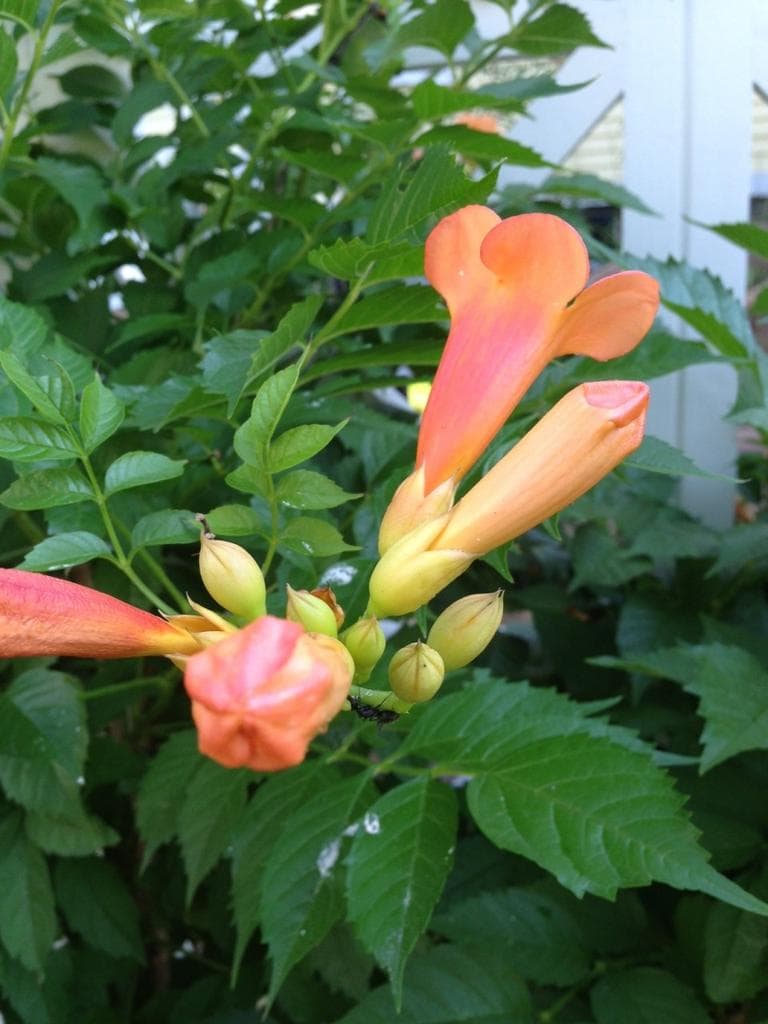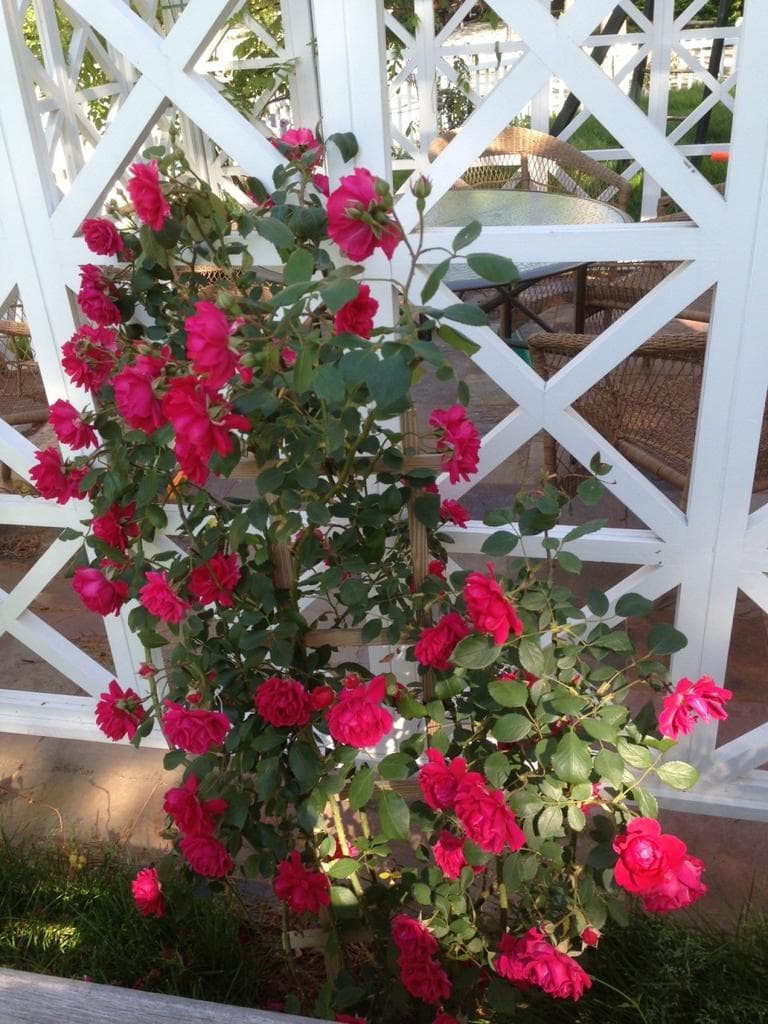Advertisement
10 Ways That Gardening Beats Parenting
Morning after morning, my garden makes me gasp with delight.
I wander out early with my coffee and see a new lupine, big as a purple ear of corn, and breathe, "Ohh!"
A couple of weeks ago, it was the lilies, gone overnight from greenish pods to red and yellow fireworks. This week, it's the trumpet vine, sudden clusters of orange petals — phallic projectiles with perfect five-point stars on the tips. (That one was more of a "Huh?!")
Growing flowers and vegetables from seed is the closest thing to magic I've found in real life. And lately, I've been thinking about the light it casts on parenting — in fact, with the disclaimer that I love my children with all my heart, I've been thinking about all the ways that gardening is better than parenting. Here are a few:
1. Bell curves
From the moment our children are born, they're placed on a bell curve — actually on many bell curves. The pediatrician's height and weight charts. The "age of starting to read" curve. It doesn't matter if the whole area inside the bell is considered "normal." Anything that seems too distant from the curve's center can fan worry.

But consider what happens when you plant a packet of tomato seeds in the loamy cells of a seed-starter kit. Each compartment and each seed looks the same as all the others, and they all get the same amount of water and sun. But lo and behold, some seedlings shoot up quickly and robustly, and others make slower, smaller progress. There it is, the bell curve embodied, but you don't have to angst about the below-average seedlings. You don't have to get them early intervention and tutoring. You just say, "Ah, life! The infinite and mysterious variation..."
2. Getting away with neglect
No single act of parenting is especially hard; it's the unrelenting series of tasks, spread out across 24 and 7, that make many call it the hardest job they've ever had. For year after year, you can never just punt. Not the basics, not the food and water and love and diaper changes. No fairy ever suddenly appears in your house and says, "Hey, let me take all this work off your hands so you can just enjoy the kids! For free!" (A fairy like that is called a nanny, and they are never free.)
But in a garden, rain does that. The rain comes in and says, "I'll take care of this. Take a break." For much of this summer, before the heat wave, Massachusetts had an unusual spell of rain, which was unfortunately very good for the weeds as well as the flowers. Day after day, I'd think, "Probably should water today," then check the weather and say, "No need." No care required today. None at all. Just enjoy.
3. Overcoming mistakes
I believe the research findings that a child's first three years of life lay the groundwork for everything that comes after, particularly in the brain. The trouble is that the Zero-to-Three research, even as it feeds better public policy, is also causing parents of small children much disquiet. Could every tantrum mean future prison time? Might every parental misstep mean permanent psychic damage?
I made a mistake born of pure impatience with some of my vegetable seedlings this spring. I just couldn't wait — my usual gardening sin — and I brought some of them out in pots too early. The cold didn't kill the seedlings, but it stunted them — and they remain stunted. But alive. And growing. Their resilience was immediately clear. I messed up and learned my lesson, but I could also see instantly that the consequences would not be dire.
4. Better stock
Genes need generations to evolve, and these days, humans in developed countries seem to have plateaued a bit on health and longevity. We're no longer getting taller and living far longer every generation.

But plant stock — scientifically bred instead of left to the vagaries of romance — seems to keep improving dramatically from year to year. Did roses always rebloom this much? Did sunflowers tower this high? I used to love the orange tiger lilies in the yard where I grew up, but they're now lackluster compared to the showier Asiatics that have moved in.
It's not my imagination. Much of what I'm seeing is likely "due to concerted breeding efforts, especially in the floriculture industry, to get brighter colors, and more colors, and longer blooming," explained Susan Scheufele, extension assistant at the University of Massachusetts Extension Vegetable Program. "People have been really working at getting more of those traits into their plants, and also more disease and insect resistance."
5. Applause
I garden in a fishbowl, in a yard on a busy corner surrounded by high-rises. Lately, as my efforts have yielded blooms, passers-by have taken to showering me with delicious praise: "You're giving so much pleasure to the neighborhood!" and ""Every day, I see something different!" A Russian neighbor told me, "Your garden seems to emit mystical energy."
I slurp up the compliments, taking greedy credit for the sweat I've invested. But no matter how much sweat you invest in your children, and how wonderfully they turn out, you'll never be showered with praise. At best, you might get "You've done a great job with your kids." But really, how can anyone know whether it was you or some other environmental factor or just the luck of the genetic draw?
6. Life, accelerated
I often feel like my life has sped up to the rapidity of a time-lapse film, that only about an hour passes between one tuck-in time and the next. I know all too well and with full poignancy that before I can turn around, the children will be grown.
My precocious flowers and vegetables only underscore that quick passage of time, but instead of prompting wistful wishes to freeze the calendar, they bring only wonder. I won't be nostalgic next year for the bounty of this year. I'll just plant more, bringing forward this year's lessons. Time is like a vitamin that I pour into my garden, spreading the wisteria and multiplying the oregano. It does not lead, inevitably, to wrenching change. It just promises more — more growth, more blooms, more beauty.
7. No Back-talk
I first posted my gardening thoughts on WBUR's CommonHealth blog, and for these next three, I'm grateful to readers who responded. One comment was this simple:
Gardening….no back talk, just the quiet enjoyment of the earth, the beauty of color, and sweet buzz of insects.
And a friend noted:
Plants have no adolescent snarky period. And they don't whine.
8. No guilt
Another wonderful reader comment:
My spouse and I have (I hope) completed our child-rearing, but that hasn’t ended the unrelenting flood of reports, books, studies, etc. of effective, ineffective, and downright damaging, child-rearing practices. Virtually every one of those has within it a guilt inducing and sometimes horrifying “Oh, s**t!” element that shines a spotlight on every flaw and shortcoming in our (well-loved, but undeniably imperfect) offspring, condemning us to eternally relive everything we did wrong, or didn’t do, or should have done.
The promise of “next year” in the garden undoes any guilt for our mistakes, and after appropriate consultation and guidance, the Japanese eggplant that withered and died last year is producing very nicely this season, thank you very much.
9. The obvious
How could I have missed this one? From a highly discerning reader:
Ah, the true difference between parenting and gardening is you get to eat what you grow in your garden and you should not do that with your children!
10. Plant a radish
And finally, another reader turned me on to "Plant a Radish," the delightful Fantasticks song below, which makes the cogent point that gardening outcomes are a great deal more predictable than parenting outcomes. Its lyrics begin:
Plant a radish.
Get a radish.
Never any doubt.
That's why I love vegetables;
You know what you're about!...
They're dependable!
They're befriendable!
They're the best pal a parent's ever known!
While with children,
It's bewilderin'.
You don't know until the seed is nearly grown
Just what you've sown.
Readers, won't you add your own thoughts about gardening vs. parenting in the comments section below?
